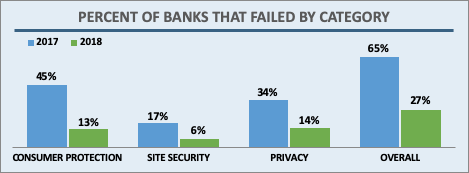Author Archives: Kenneth Olmstead
Author Archives: Kenneth Olmstead

The Lawful Access to Encrypted Data Act recently introduced to U.S. Congress may be the worse in a recent string of attacks on encryption, our strongest digital security tool online.
While the recently-amended EARN IT Act would leave strong encryption on unstable ground if passed into law, the Lawful Access to Encrypted Data Act (LAEDA) is a direct assault on the tool millions of people rely on for personal and national security each day.
LAEDA would facilitate the death of end-to-end encryption by forcing companies to provide “technical assistance” to access encrypted data upon request by law enforcement investigations.
The problem is the only way for companies to comply would be to build backdoors into their products and services, or not use encryption at all, making everyone more vulnerable to the same crime we are all trying to prevent. To be clear – we’re talking about the same encryption used to keep activities like online banking, working from home, telehealth, and talking with friends secure online.
The Internet Society raised its concerns in an open letter to the co-sponsors of LAEDA in the Senate, which was signed by over 75 global cybersecurity experts, civil society organizations, companies, and Continue reading

In April 2019 the Internet Society’s Online Trust Alliance (OTA) released its 10th Annual Online Trust Audit & Honor Roll. The Audit looks at the security and privacy practices of over 1,000 of the top sites on the Internet from retailers to governments. In this post we will take a deeper dive into the ISP/Hosts sector of the Audit. This sector is comprised of the top ISPs and other hosting organizations in the U.S. It includes everything from organizations that provide network access to organizations that host email services.
In the Audit, privacy statements are scored across 30 variables. ISP/Hosts were a decidedly mixed bag compared to other sectors, which tended to do either relatively well or poorly across the board in their statements. (Though to clear, the vast majority of organizations in the Audit had poor privacy statements, it was the most common reason for failure across privacy and security scoring.)
ISP/Hosts fell somewhat short in the presentation of their statements. OTA advocates several best practices that deal with how the privacy statement is displayed to make it as easy as possible for users to understand.
The simplest practice OTA advocates is a link to the privacy Continue reading

In April 2019, the Internet Society’s Online Trust Alliance released its 10th Annual Online Trust Audit & Honor Roll. The Audit looks at the security and privacy practices of over 1,000 of the top sites on the Internet, from retailers to government sites. In this post we will take a deeper dive into the U.S. Federal Government sector of the Audit. The Government sector is defined as the top 100 sites in the U.S. Federal Government by traffic (based on Alexa ranking). Given the nature of the U.S. Government compared to companies, this sample has some unique properties, namely site security.
The most obvious place the government excels is in the area of encryption. The reason for this is largely due to a mandate from the Homeland Security Department that all U.S. Government sites be encrypted, but the standard should still be the same for any site. Put another way, the other sectors in the Audit do not have an excuse for lagging in security.
In site security the Government sector fared the best with 100% adoption of “Always-On Secure Socket Layer” (AOSSL) and/or “HTTP Strict Transport Security” (HSTS), compared to 91% of sites overall. The Continue reading

In April 2019 the Internet Society’s Online Trust Alliance released its 10th annual Online Trust Audit & Honor Roll. The Audit looks at the security and privacy practices of over 1,000 of the top sites on the Internet from retailers to government sites. In this post we will take a deeper dive into the Consumer section of the Audit. The Consumer section is a diverse set of sites including travel sites, hotels, and dating sites (see the methodology of the report for the full list).
In 2018 the Consumer section improved its standings with 85% making the honor roll, up from 76% in 2017. This was largely due to improvements in email security. Despite these gains in overall email security, TLS 1.3 adoption was actually down in 2018 (largely due to a change in the list of retail sites). Despite this OTA advocates the adoption of TLS 1.3.
Where these sites did stand out, compared to other sectors, was in privacy scores. Overall, the Consumer sector scored 43 out of 55 on their privacy tracker score, among the highest of any sector, and 33 out of 55 on their privacy statement, also among the highest.
The Consumer section Continue reading

In April 2019 the Internet Society’s Online Trust Alliance released its 10th annual Online Trust Audit & Honor Roll. The Audit looks at the security and privacy practices of over 1,000 of the top sites in various sectors. The news and and media sector, compromised of the top 100 news and media sites according to US traffic to their websites, improved its privacy practices in 2018. Like most sites, however, there is still room for improvement in privacy statements.
In 2017 less than half (48%) of news and media sites made the Honor Roll. In 2018 that number went up significantly to 78%, largely due to improvements in privacy statements. Privacy is scored in two ways in the Audit, we look at trackers on each site and we score the privacy statements across over 30 criteria.
One area where news sites did not improve was in the use of trackers on their site. Out of all the sectors news and media scored the lowest in trackers with a score of 39 (out of 45). Part of the reason for this is the news and media sector relies on advertising revenue, which often requires the use of trackers to serve ads.

In April 2019 the Internet Society’s Online Trust Audit released its 10th Online Trust Audit and Honor Roll. One of the longest-running sectors covered in the Audit is online retailers. In this blog post we will look at the top 500 online retailers in the US based on online sales and how they fare in security best practices advocated by OTA.
Overall 65% of online retailers in the top 500 made the honor roll this year, a marked improvement over 2017 when just over half (51%) did. With the upcoming holidays many consumers will be doing much of their shopping online, therefore it is more important than ever that any online retailer practices good email and site security. After all, consumers are sending highly-sensitive data like credit cards and addresses at a much higher rate during the holidays.
In site security retailers fared well, as did most sites. Fully 92% of the top 500 online retailers has AOSSL/HSTS on their sites (virtually the same as 91% of sites overall). The good news this year is that this is a significant increase over the the 38% that had AOSSL/HSTS in 2017. The bad news is that the fact that this is Continue reading

In April 2019 the Internet Society’s Online Trust Alliance published its 10th annual Online Trust Audit & Honor Roll assessing the security and privacy of 1,200 top organizations. The Banking sector includes the top 100 banks in the U.S., based on assets according to the Federal Deposit Insurance Corporation (FDIC). Banks had a standout year, with a dramatic increase in scores across the board. Let’s take a closer look.
Overall, 73% of banks made the Honor Roll, putting the banking sector 4th behind the News and Media (78%), Consumer Services (85%), and the U.S. Federal Government (91%) sectors. In the previous Audit, only 27% made the grade. This large jump is due to improvements in all three scoring categories: email authentication, site security, and privacy.

Banks, like most sectors, came close to 100% adoption in the two main email security technologies studied in the Audit: SPF (93%) and DKIM (87%). In addition, banks saw a marked improvement in how many sites implemented both both technologies at 87% in 2018, up from 60% in 2017. This puts banks among the most improved sectors in this area.
DMARC builds on SPF and DKIM results, provides a means for Continue reading

Privacy statements are both a point of contact to inform users about their data and a way to show governments the organization is committed to following regulations. On September 17, the Internet Society’s Online Trust Alliance (OTA) released “Are Organizations Ready for New Privacy Regulations?“ The report, using data collected from the 2018 Online Trust Audit, analyzes the privacy statements of 1,200 organizations using 29 variables and then maps them to overarching principles from three privacy laws around the world: General Data Protection Regulation (GDPR) in the European Union, California Consumer Privacy Act (CCPA) in the United States, and Personal Information Protection and Electronics Document Act (PIPEDA) in Canada.
In many cases, organizations lack key concepts covering data sharing in their statements. Just 1% of organizations in our Audit disclose the types of third parties they share data with. This is a common requirement across privacy legislation. It is not as onerous as having to list all of the organizations; simply listing broad categories like “payment vendors” would suffice.
Data retention is another area where many organizations are lacking. Just 2% had language about how long and why they would retain data. Many organizations have Continue reading

In April, the Online Trust Alliance published the 11th annual Online Trust Audit assessing the security and privacy of 1,200 top organizations across several industry sectors. For the first time, this year’s Audit covered 100 of the top healthcare organizations, including lab testing companies, pharmacies, hospital chains, and insurance providers.
How did they do?
Since this is the first year these organizations were included, we do not have historical comparisons, but we can compare how healthcare sites fared against the other audited sectors. Overall, 57% of healthcare sites made this year’s Honor Roll, the lowest of all the sectors we studied. By far the most common reason for failure in the healthcare sector was weak email security (35%, nearly triple the overall average). Failure due to privacy was better than average, while failure due to site security was slightly worse than average.
Email Security
SPF and DKIM help protect against forged email. Overall 87% of healthcare organizations had SPF on their top-level domain and 67% had DKIM (the lowest of any sector, and the main source of healthcare’s failing scores). DMARC builds on SPF and DKIM results, provides a means for feedback reports, and adds visibility for Continue reading

On Tuesday July 9, 2019 the Internet Society’s Online Trust Alliance (OTA) released its 11th Cyber Incident & Breach Trends report, which provides an overview of cyber incidents – and offers steps organizations can take to prevent and mitigate the potential damage. This year’s report found a shifting landscape of cyber incidents. As the growth of some attack types levels off, others increase.
Adding it all up, OTA estimates that there were more than 2 million cyber incidents in 2018, and it is likely that even this number significantly underestimates the actual problem. OTA estimates an overall financial impact of at least $45 billion worldwide. The lead categories of attacks are cryptojacking (1.3 million) and ransomware (500,000), followed by breaches (60,000), supply chain (at least 60,000 infected websites), and Business Email Compromise (20,000).
There are many organizations that track data breaches overall. For example, Risk Based Security Reported the highest number at 6,515 breaches and 5 billion exposed records, both down from 2017. These estimates vary depending on their methodologies – see our full report for all of the breach estimates and our methodology.
One well-established attack type, ransomware, saw a decline in 2018. However, the total dollar Continue reading

For ten years, the Internet Society’s Online Trust Alliance (OTA) has published an annual comprehensive survey of 1,200 sites’ security and privacy practices. The 10th edition of this Audit has been released and can be found here. As part of the Audit, we score each site’s privacy statement against 29 criteria, ranging from whether it is linked to on the site’s homepage, to whether it states how the site handles children’s data.
For this blog post, we decided to use the Internet Society’s current privacy statement as an example, to illustrate the criteria used, and to show how a privacy statement fits into the bigger picture of an organization’s privacy practices. A privacy statement is only one piece of an organization’s overall privacy practices – although, as the public-facing piece, it is of course important. Other aspects (which are not included in the OTA survey) include:
There are myriad ways to structure a privacy statement and, to be frank, many privacy statements are written with different goals Continue reading

Privacy has become a major issue around the world. Hopeful presidential candidates, such as Elizabeth Warren, have proposed privacy legislation and European countries are beginning to issue their first judgements based on GDPR violations. Given this evolving environment, the Internet Society participated in a panel on data privacy at the ISC-West conference on 11 April 2019.
The conference was sponsored by ADT, one of the largest home security companies and an Internet Society organizational member. The panel included Frank Cona from ADT, Dylan Gilbert from Public Knowledge, Brandon Board from Resideo, and Kenneth Olmstead from the Internet Society.
The discussion focused on two main themes. The first was that in the data-driven economy, user agency is more important than ever. Users must be able to ask companies what data they have about them and be able to update or delete that data. The second was that companies must put privacy at the forefront of their business practices. Privacy cannot be an afterthought, but must be the starting point.
There was not consensus among panelists regarding whether there will be Federal privacy legislation at some point, but it was clear that the security industry should do its best to implement privacy Continue reading

Today, the Internet Society’s Online Trust Alliance released its fifth annual Email Marketing & Unsubscribe Audit. OTA researchers analyzed the email marketing practices of 200 of North America’s top online retailers and, based on this analysis, offer prescriptive advice to help marketers provide consumers with choice and control over when and what messages they receive. The Audit assesses the end-to-end user experience from signing up for emails, to receiving emails, to the unsubscribe process and its results.
In the 2018 Audit, seventy-four percent of the top online retailers received “Best of Class” designation, meaning they scored eighty percent or higher in OTA’s analysis of their email marketing. In addition, ten retailers received perfect scores, meaning they adopted all twelve of OTA’s best practices. They are: Dick’s Sporting Goods, Home Depot, Lands’ End, Musician’s Friend, Office Depot, OpticsPlanet, Sierra Trading Post, Staples, Talbots, and Walgreens.
In the subscribe process there were several positive findings. The percentage of sites that had subscribe forms that were easy for the user to find was 94% in 2018, up from 85% in 2017. In addition, one-quarter of sites offered incentives such as free shipping to entice users to subscribe, down slightly from 28% in 2018.